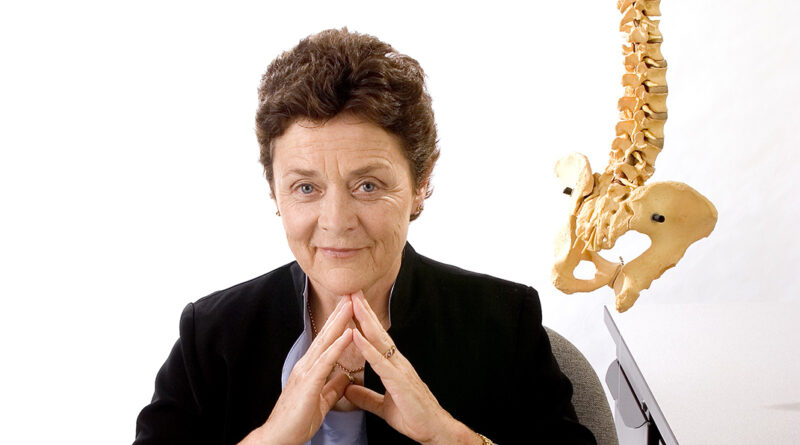No Bones About It: Susan Brown Knows Bones
Anthropologist, a bone expert and author, heads bone health organizations
By Deborah Jeanne Sergeant
When Susan Brown’s grandmother broke her hip and subsequently died because of the complications, Brown began to think about how the fracture shortened her grandmother’s life.
“I was so ignorant at first and thought it was because of aging,” Brown said. “She slipped in the bathtub. She was such an amazing person. I started thinking how long would she have lived if she didn’t have osteoporosis and rickets?”
Though 102, the grandmother was active and vibrant until the fracture caused her to lose condition. Could preventing fractures improve quality and length of life? Her interest became a life calling.
Three decades later, Brown operates Center for Better Bones in East Syracuse, along with the Nutrition Education and Consulting Service and the Osteoporosis Education Project in Syracuse.
Typically, the approach to proactive bone health is popping a calcium supplement each day. But Brown’s research has revealed that a multi-faceted approach can make a difference. Her whole-body approach can support bone growth and regeneration.
Considering Brown’s education, taking a cross-cultural approach to bone health makes sense. She earned a master’s and Ph.D. in anthropology from University of Michigan. Once she became interested in bone health, Brown also became a board-certified clinical nutritionist and licensed nutritionist.
From her anthropological studies and research, Brown discovered that cultures with the highest calcium intake have the highest osteoporosis rates — a discovery that contradicts conventional bone health advice. Brown concluded that preventing fractures is not just about calcium intake for bone density. She concluded that osteoporosis can be prevented through changes in diet and lifestyle.
These changes include balancing the body’s pH by lowering acidity and increasing alkalinity to prevent bone loss and exercising and consuming nutrients beyond calcium to strengthen bones.
Her consultations (both in-person and virtually) help clients establish risk for fracture and determine whether a visit with the patient’s physician is in order to look at any medical reasons for bone loss. Brown helps clients craft a personalized diet, medical-grade supplement plan and lifestyle changes for bone health and wellness. They also look at means of reducing physical and emotional stress and ways to become more active.
One of the biggest misconceptions about bone is that it simply forms the skeleton and protects organs.
“In a simple way, bone is extremely intelligent tissue that does many, many things for the body like helping to guarantee biochemical balance,” Brown said. “It does everything from produce immune cells to be a guardian of acid based balance within the body and healthy blood stability. Those things are essential for minute to minute existence. It serves as a gigantic reservoir of alkalizing compounds and minerals. After studying bones for 40 years, I can tell you it’s extremely intelligent tissue.”
Simply gulping a couple of calcium tablets a day isn’t enough to support the health of such complex and important tissue. And Brown added that the typical American lifestyle doesn’t help: too little activity; a highly refined food diet with too little produce; and extensive exposure to pesticides and toxins.
“One-third of people don’t have one fruit or vegetable a day,” Brown said. “We have unwittingly created a lifestyle and eating patterns that damage bone.”
She recommends increasing produce to three to five vegetables and one or two fruits per day of a variety of colors and plentiful herbs, along with some supplements to fill in any gaps.
“You can eat Cheetos and French fries, but it won’t be as well-functioning,” Brown said.
Instead, she recommends eating more beans, such as chickpeas, lentils and kidney beans for protein and trace minerals. Their fiber also supports the health of the gut, which Brown calls the “second brain,” since it sends messages to the brain and influences and is influenced by the brain.
“We need to eat more whole grains like millet, oatmeal and quinoa,” Brown said.
A varied, balanced diet heavy on produce supplies the body with sufficient nutrients to work well, including supporting bone health.
She also recommends a vitamin D test to check the level.
Physical activity also matters.
“Show your body you need bones by doing physical activity that pulls and tugs on bones and carrying around weight,” Brown said.
She recommends 40 minutes of physical activity, outdoors if possible. She advocates for functional activity — movement that helps people maintain their ability to perform activities of daily living.
“Think about what you want in the future,” Brown said. “Do you want to be vital or taking 14 medications? Do you want to play with your grandchildren? It does make a difference what you eat. Take a minute and appreciate this amazing body and how can you help it do its job.”
Because emotional and psychological stress damages bone, Brown encourages clients to break chronic anxiety and improve on emotional patterns that aren’t healthful. She said that stress causes the fight-or-flight response in the body that hurts bone health.
“We could shift our attention as we start realizing we can manipulate intention by changing our thoughts,” Brown said. “Do I want to keep that thought? Is it serving me?”
Deep breathing can help calm the sympathetic nervous system as well.
She encourages clients to form a community of likeminded people concerned about health to reduce stress, exercise and cook together and share prayer or meditation time.
“Community is healing; support and community are so important, whether two or 20,” Brown said.
A DeWitt resident, Brown loves meditation, gardening, golfing and cooking with friends. She has one grown son. Her writings include “Natural Bone Health: A Practitioner’s Guide to Healthy Bone, Joints and Muscles.” “Better Bones, Better Body,” and “The Acid Alkaline Food Guide.”

